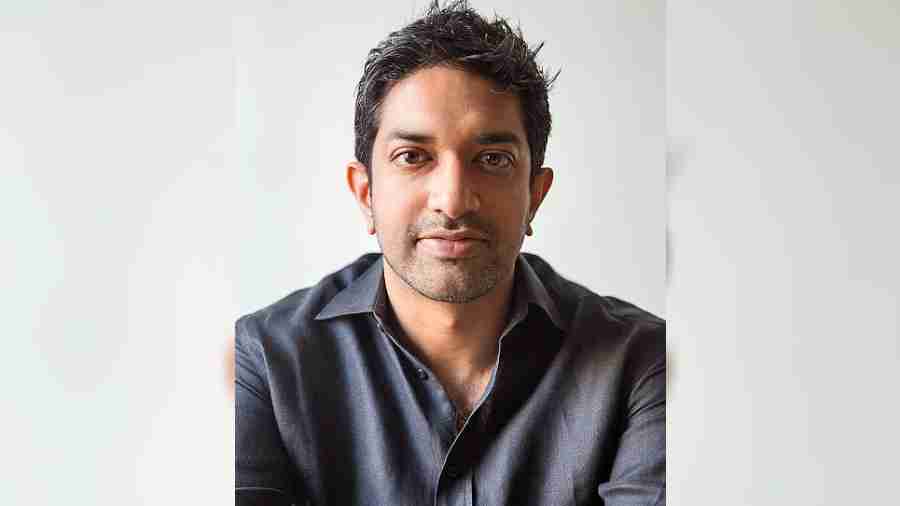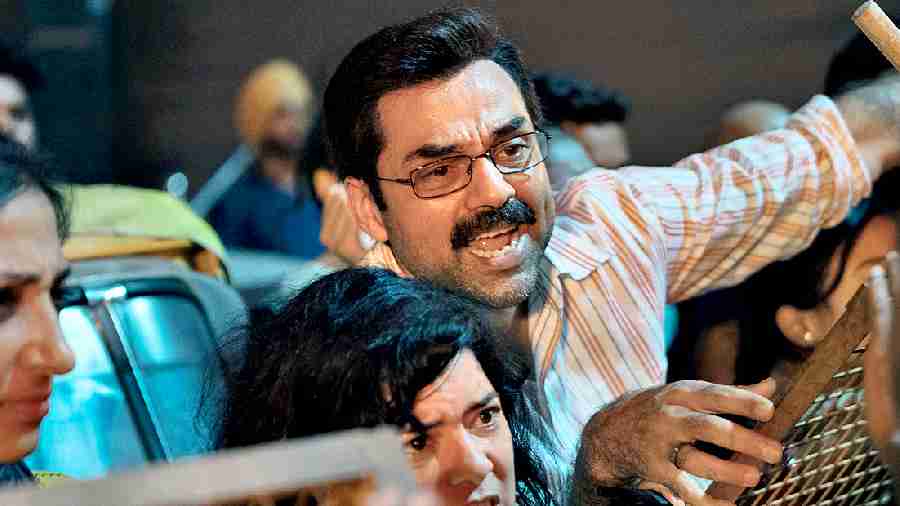Netflix has always had a successful track record with true crime — filmed either as drama or documentary or a hybrid of both — and though they would like to label Trial By Fire as a “rich human drama”, the true crime roots of the story — based on the Uphaar fire tragedy of 1997 which turned a movie hall into a tinderbox and resulted in many deaths — cannot be denied.
Trial By Fire — with Rajshri Deshpande and Abhay Deol playing real-life protagonists Neelam and Shekhar Krishnamoorthy respectively, who lost both their children in the tragedy and then waged a legal battle for 25 years in the hope of justice — has been another feather in the streaming giant’s cap, earning it both numbers and impacting with its relatable content.
The Telegraph chatted with Prashant Nair, the creator and director of Trial By Fire and Tanya Bami, series head — Netflix India — to know more.
Prashant, it’s been more than a month since Trial By Fire opened to a great response and is still going strong. What’s it been like so far?
Prashant Nair: We are still processing it because the reactions are still coming in. We feel gratified and even relieved because there has been a certain responsibility in telling this story. We know the people involved... we know how hard they have had to fight all these years and it became important to us that this story be conveyed in a way that made them happy. So the best thing for us has been how happy they have been with how we have portrayed their lives and their stories.
It’s also been very encouraging in terms of how viewers have genuinely and sincerely reacted to the show. All of them have found something that is relatable in this story and speaks to them on a personal level. Which is the idea... which is what you hope for when you make something. I am gratified that the conversation is shifting towards the larger issues and themes that this series explores, all of which are important topics today.
Tanya Bami: The honesty with which Trial By Fire has been made has resonated with most. And while it deals with a subject like grief, the journey that Prashant has explored of the protagonists (Neelam and Shekhar Krishnamoorthy) unravelling over 25 years doesn’t make this grief overwhelming for the audience. The story just doesn’t stay in grief... it processes it, helps in reacting to it and eventually moves forward with it. I think it’s the forward-looking, honest portrayal which is being appreciated.
It is a heavy subject, of course. We have got lots of reactions from people saying: ‘Oh God, we vividly remember this (the Uphaar fire tragedy). Lots of personal connections to this story is what stands out. Telling this story has been called ‘a bold choice’ but I think what we have done honestly is to simply portray the power of the human spirit. When the audience watches some sort of struggle, no matter how different their own is from what is being shown, being obliterated in the end, they feel empowered.
Tanya, in terms of numbers and the emotional impact that Trial By Fire has had, how does it empower and take forward Netflix’s vision for its original series programming?
Tanya: We have always emphasised on showing diverse stories and Trial By Fire fits right in. The fact that this is a national tragedy that feels personal drove many people to consume this show. Rooting for Neelam and Shakhar to win and seeing their triumph as their own win...I think that has really found favour.
The series decodes our environment, our systems, what can happen to us, and what should be the way forward... enlightening the viewer regarding these things has always been the role of content and people like to see their times mirrored on screen and they like to take inspiration from it.
In terms of fitting into the Netflix slate, I feel it adds a different dimension from Class, which is a young adult adaptation of the Spanish series Elite, and is the first of its kind in India. And then Cat (starring Randeep Hooda), which just preceded Trial by Fire, was very different. For us, the agenda is diversity and this involves different milieus, characters, genres, stories....
Prashant, Neelam Krishnamoorthy’s book (Trial by Fire: The Tragic Tale of the Uphaar Fire Tragedy) was your source material, but you obviously added and subtracted to make your show more cinematic. Was there an omnipresent sense of pressure and responsibility that you felt towards the book and towards Neelam and Shekhar and the other families?
Prashant: Absolutely! That’s the place we began at. These are people who have been through an unimaginable tragedy. But no matter how much you believe in what they are fighting for, as a maker, one can’t tell a story with an agenda. Audiences these days are smart enough to pick that up. You have to maintain a distance from the material. There is an inherent contradiction and difficulty that a storyteller has to navigate, which is this heavy sense of responsibility balanced by the obligation to tell the story from a little distance away.
The Krishnamoorthys were very generous. They gave us access to all the material they had. They have 45,000 documents, not only related to their case but also on the entire working of the judicial system. They introduced us to people, we had a research team and we went to a couple of victims’ association meetings and so on.
You are right that our sense of responsibility towards them weighed on us very heavily but we were very transparent with them. We admitted that we were having a little difficulty. And they told us to go and make the show we wanted to make and that they would always be available for us. Which was very generous of them and that actually increased our responsibility. This sense of responsibility was shared by almost every member of the team, from those who created the environment on set to the choices we made in the storytelling to the discussions that Tanya and her team had with us. The responsibility permeated every aspect of the film-making process.
A throwaway line in a book may just get away, but anything you put on the visual medium will have an impact.... Like their young son’s birthday just a few months after his demise is mentioned in passing in the book, but in your series, it becomes a major plot device and a turning point in the story....
Prashant: You are right. The way we treated this was as if our main character was sitting right there and telling us her story. Sometimes, the things that are the hardest to talk about are the ones that you don’t write much about. As film-makers, our job is to look closely into what is written between the lines and pick that up.
For example, there is a line in the book which says that the Krishnamoorthys have never stepped into a cinema since the tragedy. That was a very powerful idea that we showed in the fifth episode as to how Shekhar is forced to go into a cinema by his friend and what happens to his mental state when he does so. A large number of things on the show were inspired by little lines here and there.

Tanya Bami, series head, Netflix India

Prashant Nair, director of Trial By Fire
Tanya, what are the essential dos and don’ts when it comes to showing true crime on screen, be it a drama or a documentary?
Tanya: We all love a great mystery, though we hope none of us ever find ourselves in one. True crime presents a great understanding of the times we live in and of human nature. Also, watching crime is a thrilling and fulfilling experience and that is the kind of relationship a viewer likes to form with long-format storytelling. One likes to be forced to watch episode after episode and wait for the next season. That is the true test of a thriller or a crime series. Series like Aranyak, Class, Dahmer (Dahmer— Monster: The Jeffrey Dahmer Story) have done that for us.
For me, Trial By Fire is more a rich human drama than a true crime story. It’s a great depiction of people thrown into an extraordinary situation.










